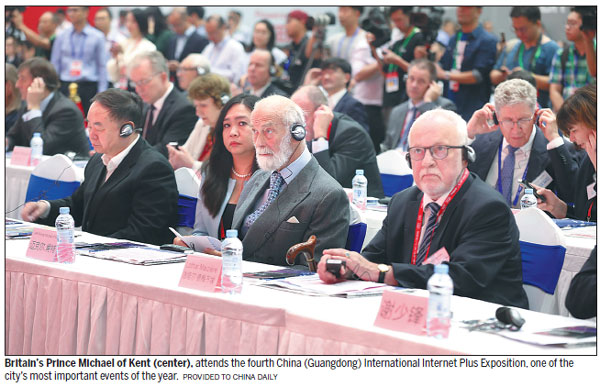The government of the city of Foshan, a manufacturing hub in China, has backed the establishment of a new group of research institutes and innovation centers to bolster its pillar industry and improve its expansion on the global stage.
A total of 12 key projects, with an investment worth more than 90 billion yuan ($13 billion), were signed at the opening ceremony of the fourth China (Guangdong) International Internet Plus Exposition, one of the city's most important events of the year, that runs from Wednesday to Saturday.
One of the main projects involved the Foshan city government and the Nanhai district government signing an agreement with Tsinghua University to build an academy for research into new materials. Foshan aims to become a national leader in the sector. Officials said the academy's achievements would not only benefit South China, where Foshan is located, but also the whole country.
The academy will focus on the technological development and commercialization of materials for renewable and sustainable energy, biomedical materials, energy-saving and environmentally-friendly materials, electronic information materials and smart manufacturing.
In other projects, the Nanhai district government will collaborate with Alibaba Cloud, a subsidiary of billionaire Jack Ma's Alibaba, to concentrate on the incubation of promising companies in a wide range of sectors - from big data, smart manufacturing and information security to internet finance and mobile internet - which will ultimately promote the transformation and upgrading of those areas.
Lu Yi, Party chief of Foshan, made a speech at the expo's opening ceremony, pledging full government support for industrial upgrade with technologies. "Foshan will unswervingly develop manufacturing as the core industry of the city ... and is studying a mode that integrates global technology, global markets with smart manufacturing," he said.

"Prompted by the expo, our city will actively push forward the combination of the digital economy with the physical economy and build a national manufacturing innovation center that has a global influence."
Just six months ago, the Foshan government announced at a technology conference that it would invest 3.5 billion yuan in the brand-new Jihua Laboratory in the next three years, which is designed to provide world leading technologies and solutions for advanced manufacturing.
The facility will start construction by the end of this year and will employ 150 doctoral students next year to enrich its talent pool, Song Zhiyi, executive deputy director of the lab, told reporters during the expo.
He noted that the research will emphasize three major aspects - robotics, high-end equipment manufacturing for life sciences and micro/nano optics.
"One of our missions is to provide solutions for the manufacturing industries to meet their needs for industrial upgrading and transformation, which would not only benefit Foshan, but can extend nationwide," Song told China Daily.
As one of the first four key labs in Guangdong, Song said the Jihua Laboratory aims to become listed as a State-level lab in the future.
"Foshan has strong manufacturing strength and it's located in the center of the Guangdong-Hong Kong-Macao Greater Bay area, which has the advantage of attracting talent globally," Song said.
Nine institutes that are participating in the construction of the lab displayed robots, sensors and micro/nano optics products at the expo, and attracted the interest of many visiting professionals.
The expo, organized by CeBIT, a world leader in digital events, has gathered 731 well-known industrial and internet enterprises from all over the world, according to officials.
Covering an area of 50,000 square meters at the Guangdong Tanzhou International Convention and Exhibition Center, the expo features six areas including advanced Internet Plus technology, digital business, digital life, innovation and entrepreneurship, robots and intelligent manufacturing.

(China Daily 10/26/2018 page7)
